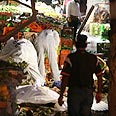

Aharon Nissim sits in his Ahitov home. His clothes are still covered with the blood of his wife, Sabiha, 66, as he cries. "I don't understand why they took her," he says. "Why did they kill her."
Family members and residents of the village began arriving at Nissim's home after they heard about the terror attack in Hadera. Sabiha, who was 66, was a mother of six children, and a grandmother to eight grandchildren.
Aharon did not want to leave his dead wife, until rescue services arrived and evacuate him from the scene.
He described his wife as a fantastic woman, and recounted how they would often go out together. Sabiha only recently retired.
"We are simple people, we don't have any issues with these murderers," cried out Aharon.
Family members of the three brothers who owned the falafel stand said that Sabiha was "a wonderful and unique" woman, and that she would arrive and buy a falafel portion almost every day." Family members of the stand's owner were shocked to hear that their regular customer was murdered in the attack.
Murdered while buying food for her daughters
Farhiya Machlouf, 53, of Hadera, was hurrying around the midday market, buying food for a meal for her daughters, who are about to begin a new academic year. On the way, she stopped at the falafel stand, where she was murdered with four other people.
Machlouf worked at Bank Leumi in Hadera for 30 years.
Liora and Miri, colleagues of Farhiya, described her as "as a great woman, quiet and modest, who raised three children – two daughters and a son."
They said that "the branch manager tried to call her, but without success. In the end he got through to her husband Haim, who also works at the same branch. Haim told him that he is in the hospital but that his wife had not arrived. Everyone began looking for her in hospitals. Now we know she has been killed and everyone is trying to help the family."
Farhiya was a dog lover, and raised two dogs at home. "They're waiting for her at home," said her friends in mourning, who also told how Farhiya loved to read. "She was a bookworm," they said.
An educator in character and deeds
The death of Jamil Qa'adan, a 48 years-old Hebrew teacher who was murdered in the attack, is the third tragedy in a row for his family from the Israeli-Arab town of Baqa al-Gharbiya. His father passed away two weeks ago, and his younger brother Ziad died on the operating table during a heart surgery about a month ago.
Dr. Jalal Askar, the supervisor of the emergency room in Hilel Yaffe hospital in Hadera, faced the hard task of establishing the death of his schoolmate from Baqa.
"He was a John Doe for us. He was brought to the trauma room in critical condition. At first we managed to stabilize him, but we failed to save his life. Only later, when I saw his name and ID number on the victims' list, I realized this was my classmate from Baqa, whom I knew so well," Jalal said.
Qa'adan arrived in Hadera after he finished work in Haifa, and was on his way to a local Bank branch near the market when the blast occurred.
Numerous visitors came to express their condolences to his family, which is one of the biggest in town.
He was an educator throughout his life, Qa'adan's neighbor Ibrahim Qashan told Ynet.
"He was a father of five – three daughters, two are students in Jordan, and two sons. He was always an educator, in his character and his deeds," he said.
"What happened in Hadera stirs up questions and feelings. There is a lot of resentment here. Entire families are being destroyed for nothing," Qashan said.
Idris Muassi, a friend of Qa'adan said: "This was a futile act with casualties coming from both people. Those who carries out these attacks act irresponsibly. The terror does not discriminate between Jews and Arabs and both people get hurt," he said.
Another friend added that terror attacks harm Israeli-Arabs twice: First when they are attributed the blame, and second when they are hurt in the attacks.
Could have been saved
Michael Keufman could have been saved from the attack, had his doctor's appointment not been pushed forward, Michael's son Alex said after the family has been notified he was killed.
Michael made Aliya to Israel in 1993 with his wife, Elizabeth, and their two children.
His son Alex recounted that his
father was scheduled an appointment for a medical examination at a clinic at the Hadera shopping mall, nearby where the blast occurred.
"His appointment was pushed forward, so he left the clinic earlier and went off to buy fruits and vegetables. It was then that the blast occurred. If his appointment had not been postponed, he may have still been here," Alex said painfully.
Michael, who served as a top executive at an automobile factory in Uzbekistan, was not able to find employment in Israel.
"We will always remember him as a wonderful father and grandfather," his son said.
Yaakov Rachmani, 68, of Hadera was also killed in the attack.
Roee Nahmias, Ahiya Raved, and Meital Yisor Beit-Or contributed to this story















